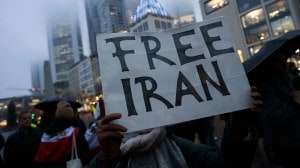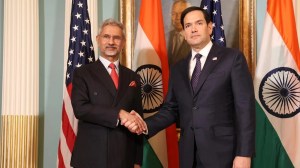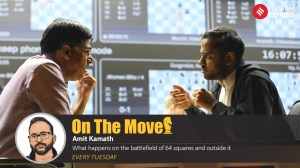Odious comparisons at 50
As we were grinding our way through our thirteenth general election, China was celebrating the fiftieth anniversary of its Revolution. Th...

As we were grinding our way through our thirteenth general election, China was celebrating the fiftieth anniversary of its Revolution. There is still to be even one general election in China. Yet, China is generally regarded 8212; even in India, perhaps most of all in India 8212; as having made an enormous success of its fifty years, compared to the mess we have made of ours. Which is a great pity. Because if there is one sphere in which we have gone far ahead of the Chinese, it is that we have translated independence for our country into freedom for our people. That can hardly be said of any other country that came to liberation in the last half-century. Yet, the fact is that few Indians are conscious of the enormous advantages of being a democracy: many regard it a sham; most denigrate it.
Perhaps because my career in the Fo-reign Service obliged me to spend a year in Vietnam under the dictatorship of Ho Chi Minh, two in Iraq under the tyranny of Saddam Hussain, and three in Pakistan under the oppression ofZia-ul Haq, I have an exaggerated appreciation of the importance of civic rights and constitutional governance. But when I recall the country-wide revulsion to even our relatively benign Emergency, I can only conclude that people have short memories. Or that generational change has made the Emergency 8211; now nearly a quarter century behind us 8211; as much of a dim historical memory as, say, the stifling atmosphere of the British Raj is to an undergraduate today. However that might be, the point is the freedoms we take so much for granted are the unrealisable and, yet, much yearned for rights of the Chinese people.
Balanced against this is the remarkable surge in economic growth that China has witnessed, in dismal contrast to our own performance. Seen from an Indian perspective, there seem to be three prime causes for the grim contrast. First, the Chinese system a combination of traditional Confucianism and contemporary communism has imparted to China a measure of discipline which it would be impossible toachieve in our chaotic democracy. For the Chinese, the imperatives of the state take unquestioned precedence over the needs of the individual; here the state is hostage to Parliament, politicians, the press, and the people, not to mention the judiciary and the permanent civil service. Little gets done because everything is ensnared in controversy. But would we want it otherwise? Can freedom, liberty, democracy, the right to dissent, the right to appeal be reconciled with the iron hand that rules the Chinese, with the pro-position that political freedom can be suppressed if the figures on the economy are good?
Second, the Chinese system permits of U-turns. Ours does not. Thus, Deng Xiaoping decides on the Four Modernisations on the principle of its not mattering in the least what colour the cat is so long as it catches mice and geared to the goal that quot;it is nice to be richquot; and, therefore, what does it matter if it is not Marxist? He does so in the same year, 1978-79, that the Indian civil servant mostresponsible for the licence-quota-permit regime, L.K. Jha, pens an astonishing monograph, quot;Economic Strategy for the Eightiesquot;, which charts for India in the decade of the eighties virtually the same path on which the Chinese set out in the eighties. The Chinese persist with single-minded determination. We hem, we haw, we start, stall and try to start again. Why? Because in China the human cost of the economic miracle is brushed aside as an historical irrelevancy; here we listen even to the poor rich boys of the Bombay Club. Would a democracy like India tolerate the yawning regional disparities, the galloping unemployment, the disruption of communities and the trampling of human rights that have been so much a part of the Chinese economic miracle? Is it not precisely our hesitation over making human sacrifices at the altar of Mammon that makes our growth path so much more consensual, so much more humane 8212; and so much more slow? Moreover, can a nation which won its freedom on the moral principle that the endsnever justify the means decide as casually as the Chinese did that the colour of the cat is of no moral, philosophical or political significance?
Third, the contrast between the NRC and the NRI. More than two-thirds of the foreign investment in China has been by the Non-Resident Chinese. Our NRI counts it as patriotism to collect from the RBI a much higher interest rate than he would in any bank in London or New York and then spirit his money away 8212; as he did in the crisis of 1990-91 8212; as soon as things get a little hot in the land he has left behind. This, incidentally, is the patriotism that shrilly roots from abroad for the BJP 8212; I call it the patriotism of the netizen. The NRI has little money compared to his NRC counterpart 8212; and what he has he hesitates to share with his janmabhoomi. Therefore, the illusion that there is oodles of foreign investment drooling to come into our land will remain an illusion so long as the NRI remains as self-centred, self-absorbed and selfish as he has shown himselfto be. Did you watch Lord Swaraj Paul on TV wriggling and rambling when asked by the quot;captainsquot; of our industry 8212; who would not add up to even subedar majors in the land of our Labour peer8217;s present residence 8212; why he and his ilk were doing so little to share their booty with Resident Indians? Which, alas, is one more reason why China8217;s path can no more be our path than China8217;s Chairman ever was our Chairman.
Prannoy Roy once surprised me with a question on TV as to what I estimated to be our loss in growth consequent on our being a democracy. quot;Two per cent per year,quot; I hazarded. So, said Roy triumphantly, we would have been twice as well-off today if we had not been a democracy. I did not have the wit to ask him whether he would be prepared to take twice his present profits for removing himself from the small screen altogether. For that, after all, is why there is on the BBC a quot;Question Time 8211; Indiaquot; but no quot;Question Time 8211; Chinaquot;. In China, people like Prannoy Roy are jailed or shot. Delightfulthought 8211; but would we want it?
The writer is a Congress MP. These views are his own
- 01
- 02
- 03
- 04
- 05































